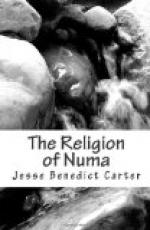Among the Greek gods who came into Rome we saw the entrance in the middle of the third century before Christ of a pair of deities of the Lower World, Dis and Proserpina, and in connexion with the introduction the establishment of certain games called “secular” because they were to be repeated at the expiration of a century (saeculum). The initial celebration was in B.C. 249, one hundred years later with a slight delay they were celebrated again in B.C. 146, the next anniversary was omitted because it fell in the midst of the civil war between Caesar and Pompey, but now Augustus wished to celebrate them. There were chronological difficulties, but they did not prove insurmountable. An oracle was set in circulation, or one actually in circulation was made use of, wherein it was declared that a great cycle of four times one hundred and ten years had passed and that a new age was now beginning. The emperor, if not responsible for this oracle, was very willing to accept it. It was an essential part of his plan that all things should become new, and that with the new age should come a new spirit. This new saeculum must be ushered in by games which should be at once like and unlike those of past centuries. They were to be celebrated at least in part on the hallowed spot, the Tarentum in the Campus Martius, they were to extend through three nights like the old games, but the three days were to be added as well, and the deities worshipped in the night, while they were no longer the old gods of the Lower World, Dis and Proserpina, were at least mysterious deities of fate and fortune, while the gods of the day, Apollo and Artemis, Juppiter and Juno, were as new to the games as the day celebrations themselves were. But the equality of Apollo and Juppiter was expressed not merely in the parallelisation of Juppiter-Juno with Apollo-Diana. It was still more in evidence on the third and greatest day of the festival, when the procession of three times nine youths and three times nine maidens sang the song in honour of Apollo and Diana, which Horace wrote and which has been preserved to us among his writings, the Carmen Saeculare, and to which in addition the recently found inscription giving an account of the games bears witness in the words carmen composuit Q. Horatius Flaccus (C.I.L. vi. 32323). On this day the procession started from the Apollo temple on the Palatine, and went over to the Juppiter temple on the Capitoline, and then back again to Apollo on the Palatine, thus indicating not only the equality of Apollo and Juppiter but even the superiority of the former. A new age had indeed begun, an age in which the new associations of the Palatine and the glamour of imperialism were to overcome the more democratic associations of the Capitoline with its incorrigibly republican Juppiter. Greek gods which had hitherto in theory at least been subordinated to the gods of old Rome were now granted not only equality but superiority. The specific cult of




